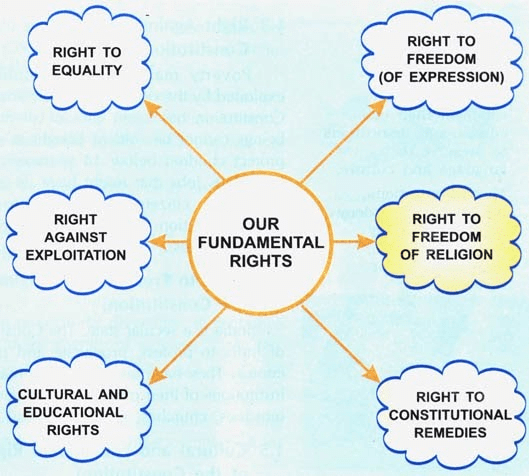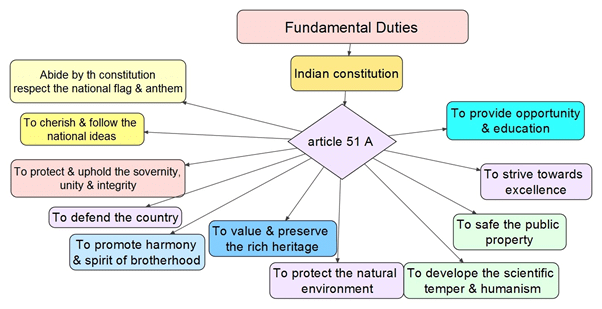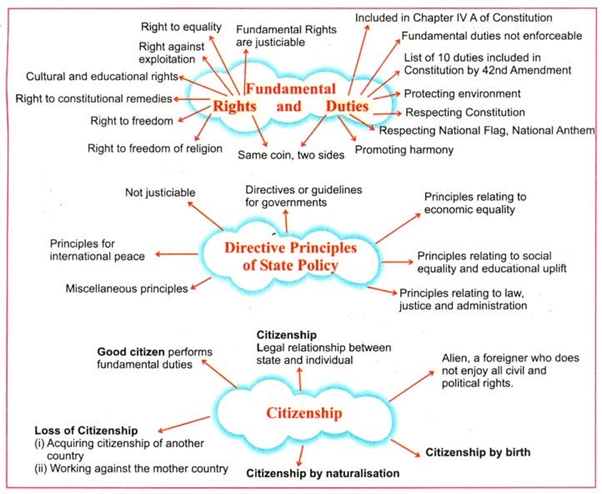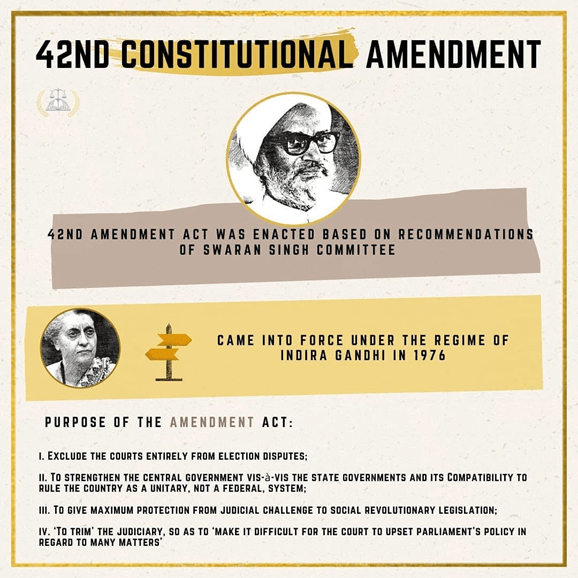DSSSB TGT/PGT/PRT Exam > DSSSB TGT/PGT/PRT Notes > General Awareness & Knowledge > Relevance of Fundamental Duties
Relevance of Fundamental Duties | General Awareness & Knowledge - DSSSB TGT/PGT/PRT PDF Download
Relevance of Fundamental Duties
- Citizenship is the validation of the social contract between the people of the country and the government elected by them, which is legitimized by the Constitution of a country. The rights of the citizens are the basis of this contract.

- While emphasizing on rights, it is very important that the citizens are also sincere about their duties towards the society at large and the country, especially its safety and security imperatives.

- Close scrutiny of the Fundamental duties indicates that a number of them refer to values, which have been part of Indian tradition, mythology, religion and practices.
The Relationship between the Fundamental Rights, Directive Principles and Fundamental Duties
- The Indian Constitution provides different sections of Fundamental Rights, Fundamental Duties and Directive Principles of the State Policy to regulate the conduct of citizens among each other, and the state’s conduct with the citizens. These different segments of the Indian Constitution provide a rule book of rights, duties, and guidelines for citizens’ behaviour and conduct along with the parameters with which the government has to keep itself fully aligned while making laws.
- Fundamental Rights are defined as the basic human rights of all citizens. Part III of the Indian Constitution contains all the fundamental rights applicable to all the individuals irrespective of race, religion, caste, creed or gender or place of birth. All these rights are enforceable by the courts, subject to specific restrictions. The basic idea behind formulating these Fundamental Rights is to protect the liberty of citizens and to maintain the social democracy of the country based on the factors of equality in society.
- The Directive Principles of State Policy serves as guidelines for the government to incorporate while framing the laws. These principles are enshrined in Part IV of the Indian Constitution set forth the fundamental guidelines for the State to apply in framing, enacting and passing laws establishing a social, economic democratic nation.
- The Fundamental Duties have been defined as the moral obligations of all the citizens to help promote the welfare of the country and to uphold the unity of the nation. These duties are set out in Part IVA of the Indian Constitution concerning the individuals and the nation. Just like the Directive Principles, these duties represent guidelines that the citizens should obey for the welfare of a democratic nation.

➤ Concept of Duties in India
- India is one of the few countries in the world with a glorious tradition of democracy since ancient times, where people have had a tradition of performing their duties.
- Since time immemorial, an individual’s “kartavya” — the performance of one’s duties towards society, his/her country and his/her parents, was emphasised.
- The Bhagwad Gita and Ramayana also ask people to perform their duties. In the Gita, Lord Krishna ordains, “One should do one’s duties without expectation of any fruits”.
- According to Mahatma Gandhi the very performance of a duty secures us our right. Rights cannot be divorced from duties.
- Mahatama Gandhi held that “Satyagraha was born, for I was always striving to decide what my duty was.”
- Also, Swami Vivekananda observed, “it is the duty of every person to contribute in the development and progress of India”.
- A very significant feature of the Indian Constitution is that it balances citizens’ rights and duties.
- Fundamental duties were added by the 42nd Amendment Act 1976 upon the recommendation of the Swaran Singh Committee.

- According to Indira Gandhi, “the moral value of fundamental duties would not be to smother rights but to establish a democratic balance by making people conscious of their duties equally as they are conscious of their rights”.
➤ Importance of Duties
- Many nations across the world have transformed into developed economies by embodying the principles of “Responsible Citizenship”.
- Responsible Citizenship: All the responsibilities and duties that citizens of a nation should exercise and respect.
- The USA is a classic example in this respect. The Citizens’ Almanac, issued by the US Citizenship and Immigration Services, details the responsibilities of its citizens.
- Another example is Singapore, whose growth story has been fuelled by its emphasis on the relentless pursuit of duties by its citizens. As a result, Singapore has transformed from a less developed nation to a highly developed one in a short span of time.
Relevance of Fundamental Duties in Present Times
- Even three decades after the fundamental duties were incorporated, there’s no adequate awareness among citizens.
- In 1998, Atal Bihari Vajpayee’s government had appointed the Justice J.S. Verma Committee to operationalise the suggestions to teach fundamental duties to the citizens of the country.
- Today, it is important to emphasise the need to remember fundamental duties for the progress of India.
- Fundamental duty enshrined under Article 51A(e) seeks to promote harmony and the spirit of common brotherhood, transcending the barriers of religion, language, etc.
- However, India’s democratic setup, over six decades has not fully able to forge this common brotherhood.
- Similarly, there is a duty under Article 51A(g) to protect and improve the environment, but India has been severely affected by air & water pollution and the impact of climate change.
- Fundamental duty envisaged under Article 51A(h) developing a sense of oneness, a scientific temper and the spirit of inquiry, nor a healthy, secular attitude.
- On the contrary, the school environment and social milieu are such that children learn all the wrong things about each other and become victims of social prejudices.
- India has a composite culture (under Article 51A(f)), “Vasudhaiva Kutumbakam” sums up that perspective.
- However, presently there is growing intolerance in Indian society, reflected by cases of cow vigilantism, mob lynching, etc.
- Democracy cannot establish deep roots in society until the citizens don’t complement fundamental rights with their fundamental duties. For a polity to survive, citizens should have a high sense of duty.
- Universally, great emphasis has been laid on citizens’ duties. Article 29(1) of the Universal Declaration of Human Rights states:
- It states that “Everyone has duties to the community in which alone the free and full development of his personality is possible.”

Way Forward
- Recently, the Prime Minister of India has rightly said that our children should be taught the Constitution.
- Incorporating the essential aspects of fundamental duties in all oaths and pledges.
- The Supreme Court has said that since duties are obligatory for citizens, the state should strive to achieve the same goal.
Rights and duties have to exist together. Rights without duties will lead to anarchy. In this context, the Fundamental Duties serve as a constant reminder of national goals as well as inculcate a profound sense of social responsibility.
The document Relevance of Fundamental Duties | General Awareness & Knowledge - DSSSB TGT/PGT/PRT is a part of the DSSSB TGT/PGT/PRT Course General Awareness & Knowledge.
All you need of DSSSB TGT/PGT/PRT at this link: DSSSB TGT/PGT/PRT
|
266 videos|355 docs|31 tests
|
FAQs on Relevance of Fundamental Duties - General Awareness & Knowledge - DSSSB TGT/PGT/PRT
| 1. What are the fundamental duties in India? |  |
| 2. Are fundamental duties legally enforceable in India? |  |
Ans. No, fundamental duties are not legally enforceable in India. Unlike fundamental rights, which can be enforced through legal remedies, fundamental duties do not have any specific provisions for enforcement. However, they serve as guiding principles for citizens and are considered essential for the overall well-being of the nation.
| 3. What is the relevance of fundamental duties in India? |  |
Ans. Fundamental duties play a crucial role in promoting a sense of responsibility and active citizenship among the people of India. They serve as a reminder that rights come with certain responsibilities and obligations towards the nation and society. By following these duties, citizens contribute to the progress and development of the country.
| 4. Can fundamental duties be amended or modified? |  |
Ans. Yes, fundamental duties can be amended or modified by the Parliament through a constitutional amendment. However, any such amendment should not violate the basic structure of the Constitution. So far, no amendments have been made to the fundamental duties since their inclusion in the Constitution in 1976.
| 5. Are fundamental duties applicable to non-citizens of India? |  |
Ans. No, fundamental duties are applicable only to citizens of India. Non-citizens, such as foreign nationals or individuals holding other citizenships, are not bound by the fundamental duties mentioned in the Indian Constitution. These duties are specifically meant for Indian citizens to promote their active participation and commitment towards the nation.
Related Searches






















